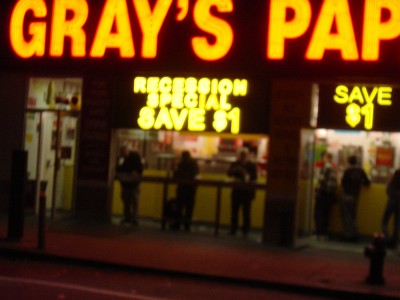
Years ago, I once had a conversation with an economist who freely admitted that there was no unified macroeconomic theory. What works versus what doesn’t work in a particular sociopolitical context is really just so much spitballing. This never surprised me given the complex realities of global capitalism.
I’ve been genuinely perplexed by Barack Obama and Tim Geithners’ macroeconomic policies regarding managing the US through this Big Recession. So, today’s news that the administration was extending the $700B financial bailout until next October came as no surprise. I was reading a very interesting blog post on The North Star National, “As Obama and Geithner continue Bush’s too-big-to-fail fiasco, blue may turn red in 2010,” which contextualized Obamanomics. The right is blasting the Obama Administration for Keynesian statist interventionism, while the left, including fellow Democrats in Congress, is getting increasingly impatient with the lack of Keynesian stimulus. Who’s right?
Well, the fact of the matter that in terms of economic policy, precious little has changed since the heady deregulatory days of Bill Clinton when the economy was flying high. What has changed is the economy itself. Valuations of assets have often been distorted and instruments and markets were allowed to be developed in ways that underestimated or distorted the risks. Of course, nobody expects the Spanish Inquisition, so many were caught off-guard when the house of cards fell and the asset bubble burst. How did this happen? Only a select few know that the house of cards of the economy was built with a stacked deck. In the aftermath, the economy languished and unemployment rose. All the while, the meter was running with Team America, World Police, with surge on the way.
So, while billions are being pushed towards the “too big to fail,” what’s being ignored are::
- Job creation, as double-digit unemployment sweeps the nation
- Consumer debt forgiveness/restructuring
- A restoration of faith in financial intermediaries
While Wall Street got theirs, I’m concerned that “Main Street” is left high and dry. The danger is a negative feedback loop, where unemployment not only leads to more consumer debt, bankruptcies, foreclosures, and lower consumption and savings {further tightening credit}, but less tax revenues. Less tax revenues at the federal, state, and local levels. Unless the economy turns around soon, the next crisis will be the local governments with the critical services they provide saying the well is dry.
Recently, I saw Joe Biden doing a song and dance on the Daily Show::
| The Daily Show With Jon Stewart | Mon – Thurs 11p / 10c | |||
| Joe Biden Pt. 1 | ||||
|
||||
| The Daily Show With Jon Stewart | Mon – Thurs 11p / 10c | |||
| Joe Biden Pt. 2 | ||||
|
||||
Readers in Canada can see the interview here in a link to the full episode on the Comedy Network.
Biden claimed that the bailouts were necessary to prevent a fully-blown depression. I’m not convinced. The NorthStarNational blog makes reference to a report that is very critical of the Obama/Geithner approach. The preface starts out with this::
“The Obama administration has implemented several policies to “jump-start” the U.S. economy. Two core premises are thatmonetary measures are required to strengthen the financial system before the rest of the economy can recover, and that most major banks have a temporary liquidity problem induced by malfunctioning financialmarkets.The administration’s efforts have largely focused on preserving the financial interests of major banks. Research Associate Éric Tymoigne and Senior Scholar L. Randall Wray believe that maintaining the status quo is not the solution, since it overlooks the debt problems of households and nonfinancial businesses—re-creating the financial conditions that led to disaster will set the stage for a recurrence of the Great Depression or a Japanese-style ‘lost decade.'”
What are the answers? At the risk of sounding populist, there needs to be real job creation on a large scale and deficit be damned. Oh, and about Afghanistan and its hefty pricetag…
Twitterversion:: #TimGeithner& #Obama extend fin.bailout, but w/unemp% in double-digits, what about consumer spending, savings, & tax rev? http://url.ie/3yv5 @Prof_K
Song:: The Hold Steady-“Stuck Between Stations”

Comments 1
Tweets that mention Clowns to the Left of Me, Jokers to the Right—Dude, Where’s My Stimulus? » ThickCulture -- Topsy.com — December 9, 2009
[...] This post was mentioned on Twitter by Thom, Kenneth M. Kambara. Kenneth M. Kambara said: #TimGeithner& #Obama extend fin.bailout, but w/unemp% in double-digits, what about consumer spending, savings, & tax rev? http://url.ie/3yv5 [...]